BUSHFIRE Survivors for Climate Action (BSCA) have spoken out following the release of the National Climate Risk Assessment (NCRA).
The group is urging the Albanese Government to set a 2035 climate target strong enough to save lives.
They are also calling for coal and gas corporations to pay a climate pollution levy to fund the vast costs of climate adaptation.
“It would be a drop in the ocean for them, and a lifeline for our communities,” Pappinbarra Valley RFS volunteer and BSCA member Chay Khamsone told News Of The Area.
“This is not a game of monopoly where we congratulate the winner on a fair game of hoarding all the resources.
“This is our lives and our children’s futures.
“As a frontline volunteer, I’m asking for your help to push for this change and ‘Ask Big Polluters to Pay’.”
The NCRA warns that on the current path of emissions reduction, the world will reach 2.7 degrees of warming by 2100.
The report makes clear that future impacts will be cascading, compounding, and happening all at once.
Communities, particularly those in the regions, outer suburbs and in northern Australia, are expected to be hit the hardest.
They will face risks to health, homes, insurance and infrastructure.
Food production and the natural environment are also at stake.
Dangerous fire weather days are projected to continue to increase in frequency in southern and eastern parts of the country, with a longer fire season and potential for more megafires.
Bushfires were identified as key risks across all seven of the country’s “key systems” including national security, economy, health, infrastructure and primary industries.
The findings come in the wake of bushfires like those experienced in Port Macquarie and across NSW from November 2019 to February 2020.
They caused major property destruction and claimed 26 lives.
“We greet this report with a mix of emotions: dread, relief and optimism,” said Serena Joyner, CEO of BSCA.
“The report findings lay out in shocking black and white what our members know in their hearts from their own bitter experience – that catastrophic climate change is unfolding now and will get much worse in the years to come.”
By Sis HIGGINS



